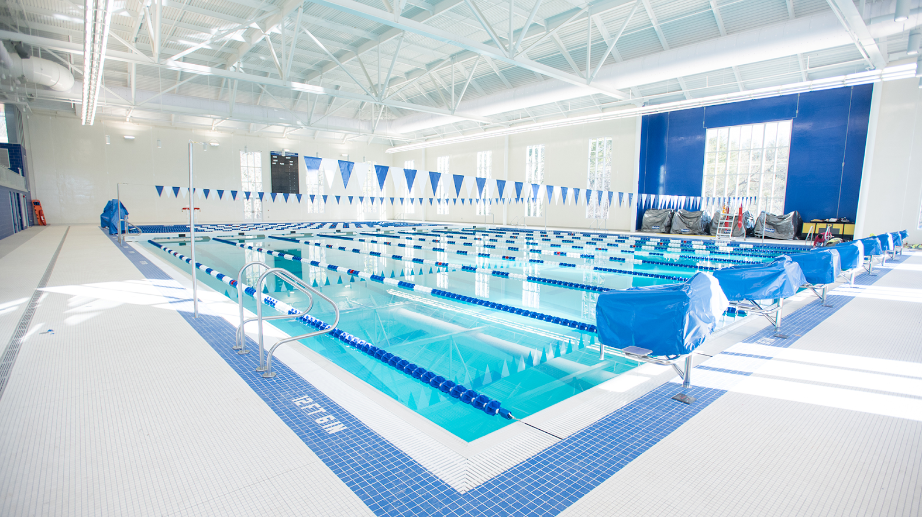Sink or Swim? The University no longer adequately prepares students for life.

By John Lane, ‘74
Washington and Lee University has dropped its mandatory swim test for students beginning with the class of 2027. The university’s much ballyhooed $22.4 million natatorium opened in 2017. Among other features, it offers “wet classrooms.”
Do you hear the loud clanging of cognitive dissonance yet? The university offers state-of-the-art aquatic facilities without ensuring that each student is equipped to use them — much less able to gain a needed life skill beyond their time at W&L.
~A Parable~
My Dog Paddle:
Up to the age of 10, I could not swim. I was raised in a small town. No helicopter parents, no swim lessons. Like other kids there we were mostly free range, making our own fun. I could not join the other kids in the deep end of the town pool. Finally, I barely learned to jump and drift and dog paddle. I thought I could swim well enough. Not quite!
Summer Camp:
At age 11, my parents sent me to summer camp on the 2-mile wide Neuse River
in North Carolina, to learn swimming and boating skills. Near our SW Virginia home, Smith Mountain Lake was forming. My parents wanted us to be ready for the lake. The camp taught sailing, small motor boats, diving, scuba, etc. Life jackets were required on these boats, but the camp only allowed swim able campers to use the boats without staff onboard.
I failed the first swim test, hyperventilating in ice cold well fed water at their lake. I had to wear a red color– neck band. We ‘red banders’ were the lowest form of life among campers. After a week’s effort I swam the length of their lake pier without hyperventilating from the cold water. I earned my boating badges. I thank my parents, and Camp Sea Gull, for forcing me to achieve better swim skills.
Smith Mountain Lake- Two Lives Saved:
At age 12, when Smith Mountain Lake finally filled, I was a confident swimmer. By age 15, I began working summers with a marina operator, building docks, handling boats, and scuba diving to salvage dropped engines, dock related fishing gear, sunglasses, watches, etc. The owner’s son, Rick, was a good swimmer and my co-worker.
One day a man rushed in, shouting that a boat on the lake had suddenly capsized after hitting another boat wake—an adult and one child were suddenly trapped underneath. Their boat was slowly sinking.
Rick and I jumped in a speedboat and raced out to help. No emergency officials were there. I piloted as Rick stripped to his shorts for action. I maneuvered our boat close to the upside-down craft, we could hear air hissing slowly through the bow light. We could hear the woman and child screaming under the sinking boat.
Rick leaped over the side in shorts with a knife in case of entanglement. He guided each person out to daylight. The boat was about to go under. His swimming skill and courage in the emergency saved two lives that day.
Tubing The Maury at Flood Stage:
While at Washington and Lee, I foolishly tempted fate in the Maury River at flood stage. This was on day three of rising flood waters. The water was brown, surging over rocks the size of automobiles. Several other students were in our group. We had tubed the prior two days as the water rose, so we judged it safe enough to go again.
As soon as we sat in our inner tubes and launched, the current overwhelmed us. Two hundred yards downstream in mere seconds — coming up fast was a huge cross-river hydraulic that would have trapped us underwater.
Another student and I were first to abandon our tubes, and a frantic swim across the foaming cross-current began. Shore was 20 feet away. We both flailed across, the powerful current bashing us into rocks. I grabbed an overhanging branch. The other guy grabbed my foot to hang on, then clawed up my body and got a better branch; I crawled up on him to the bigger branch. We barely reached the rocks, coughing up water, bruised and dazed.
We searched for the others, climbing up the stone retaining wall to the road to get a better view. On the road we saw a buddy, the best swimmer in our group, lying motionless on a rock nearly across the river, blue-gray in the face. He had been a champion swimmer in high school.
A third student down river 100 yards on our side, swam across and helped the near drowned student jump into the water and across a six-foot-wide rushing torrent. They crawled along the rocks upstream all the way back to cross over a small bridge spanning the Calfpasture River.
We all nearly died that day. Yes, we were ALL stupid. At least swimming skills saved us from our own stupidity.
Florida Gulf Coast-Our Small Children:
Our family moved in 1988 to Southwest Florida. Neither of our children, aged three and five, could swim. The two highest death risks for small children in Florida were garage door entrapments (before the auto reverse sensors) and swimming pool drownings. The first thing even before all the moving boxes were emptied was to hire a swim coach to teach our children.
Every house down there had a pool. A canal was abutted at ourback yard. The beach was three blocks away. We had a fourteen-foot fishing boat. As parents we protected our children by teaching them to swim.
If babies can do it, surely the university should take the responsible path to teach college students who have not benefited from parental initiative. Here is a graphic example of how well the human infant can adapt.
Lexington and Beyond:
Washington and Lee University enjoys idyllic environs. The Maury River is so close, so inviting. Students have enjoyed its cooling pools and rapids for decades. As they graduate and set course upon the seas of adult life, they will go to the beach, the lake, the river, travel across oceans, sail, and ride kayaks, canoes, ski boats, and ferries.
As aviators, engineers and product liability attorneys know, enough repetitions will often reveal a “remote” risk to be an eventual accident. The same holds true for daily life. Take a wrong turn and end up in a river; get caught in a rip tide at the beach; take a cruise and the ship founders in a storm; capsize a canoe while river fishing. As young Clint Eastwood learned when his military aircraft engine failed over the Pacific, swimming is a lifesaver.
In Loco Parentis-Washington and Lee University:
Parents must trust the school to teach our youth not only intellectual skills, but life’s physical necessities so that they can survive the unexpected.
When parents send their children to W&L, “in loco parentis” is not just a dead Latin maxim, it is a legal obligation W&L carries — to help students gain life skills. That is what good parents do. But if they are not able, or are missing, the school should teach students needed skills while they are still in a learning environment.
Regardless of a student’s political stripe, swim skills should be part of their required college lesson portfolio, along with any required academic course.
Each W&L graduate should be equipped with swimming skills to not only survive, but possibly to act decisively in helping others survive. Such physical skills undoubtedly give a student confidence to better engage the world on its physical and intellectual terms.
The Board of Trustees rules the roost. Their primary duty is owed to the students’ welfare and proper instruction. The university is more than a private nonstock corporation with an over $2 billion endowment and shiny new buildings.
In Closing:
Sure, we all started off uncertain and uncomfortable. But that goes for academic exploration as well. Teaching courage and confidence is part of the university’s mission to prepare students as capable adults in a positive society, to give them the skills and confidence to survive common risks and uncertainties of life.
Was the student mandatory swim test dropped to spare a few snowflake students from the terrible experience of being ‘uncomfortable’ in attempting a new skill? Was this done because the administration thinks the swim test is …..wait for it…..racist? Like eating meat? Or math? Or Dr. Seuss?
Remember why the university is here. Make sure each student who is physically able learns to swim. The swim test is far more valuable to students than drowning them in DEI race-baiting indoctrination.
JEL, III/ Class of ‘74
The Generals Redoubt (TGR) is a non-partisan 501 (c) (3) organization that is not aligned with, nor supports, any political party, individual, or organization.
https://www.thegeneralsredoubt.us/support
To donate by check please make payable to:
The Generals Redoubt and mail to: The Generals Redoubt, P.O. Box 1097, Lexington, VA 24450. Thank you.
